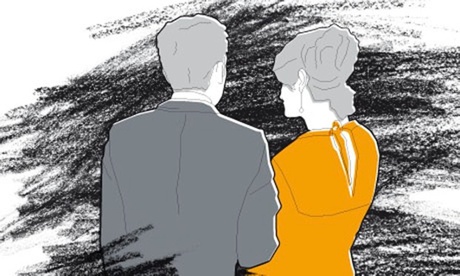
Every morning as I stand under the shower, I look at my body in the mirror. I’ve been doing it for decades, ever since I started sprouting hips. In my childhood home, we had mirrors everywhere, so the temptation to gaze into them was always present. When I scan my body up and down now, it’s a habit, a ritual that’s as ingrained as making the first coffee of the day.
If I’m in a hurry, I give my body the equivalent of a polite hello: a quick sweep of the eyes from head-to-toe. On less frantic mornings, I give it a more detailed inspection before the mirror steams up and obscures the view: I look at my bruises, a purple, green and yellow kaleidoscope of accidental knocks and bangs that change colour every day. I run my flat palms over silvery stretch marks as though I’m ironing out creases in an item of clothing. I notice my skin turning from blue-white to lobster-red in seconds, because I like the water seriously hot.
Sometimes R joins me and I look at our reflection and fantasise that we are Donald Sutherland and Julie Christie in Don’t Look Now. In reality, we look far more like John and Yoko on the cover of Two Virgins.
My body has changed dramatically over the years, but I appreciate it more than ever. It’s wholly familiar, the only thing that I go to bed with and wake up in that’s exclusively mine. When I didn’t like it – despite the fact that it had never let me down once – it was because I thought that it was disappointing to others.
Inflation from many pregnancies – followed by swift deflation post-labour – make it look as if it once belonged to somebody else, and I’ve picked it up second-hand: a pillow that when new was plump with goose down, but that has since been put through a boil-wash so the feathers inside have clumped and lumped together. Yet despite years of disordered eating (which I’ve pretty much overcome, and was more to do with the state of my head than the size of my bum), I like my body. And vain as it may sound, I like looking at it.
Everything changes, but it’s the process of change that is most interesting. Mirrors are a very literal way of observing human metamorphosis. The major transformation that occurs with ageing is not obvious from one day to the next, but it’s fascinating how the way we feel has such a dramatic effect on the way we view ourselves.
If I’m particularly stressed or pissed off, I’m far more likely to look at my reflection and think, “My stomach looks like I swallowed a baby.” The next day, in a better mood, I’ll think how charming its curve is.
When I first chanted the serenity prayer – “God, grant me the serenity to accept the things I cannot change, the courage to change the things I can, and the wisdom to know the difference” – in an Al-Anon meeting, I still thought R was the thing I could change, yet I didn’t think I needed to change myself. Not exactly an edifying start to recovery.
Why didn’t I see that looking in the mirror – something I was expert at – was a sure sign that I should have been focusing on myself, rather than R?
Now, if I don’t like something I tend to ask myself whether I can change it, and if the answer is yes, whether I can be bothered. My too-short-for-my-body legs? They cannot be lengthened (short of surgery), so I have learnt to accept them. My neurosis? It’s a family trait and perhaps there is no such thing as a cure, but I am trying not to over-react at the slightest sign of trouble.
If I could be arsed, I would take daily photographs of my family and me. I could then watch the whole sagging, creasing, wrinkling, process of life played out before my eyes, like the reverse of time-lapse photography where flowers blossom and grow. I would also keep a diary, and write regular gratitude lists.
It’s a shame I’m so lazy. I love scraps of paper that I can write things down on and then chuck away. I love mirrors because of – rather than in spite of – the fact that they never hold on to the image being reflected. They give everyone the chance to keep on changing their story.

